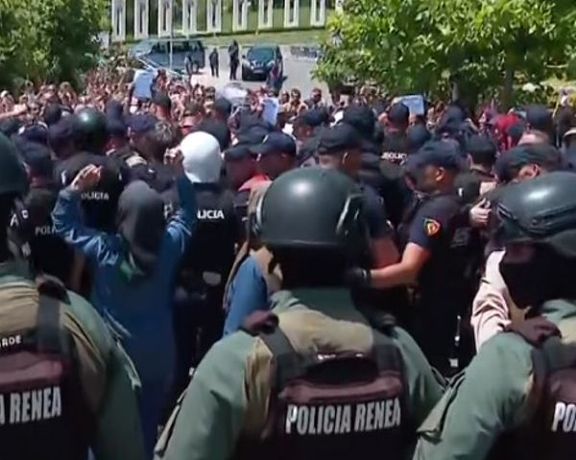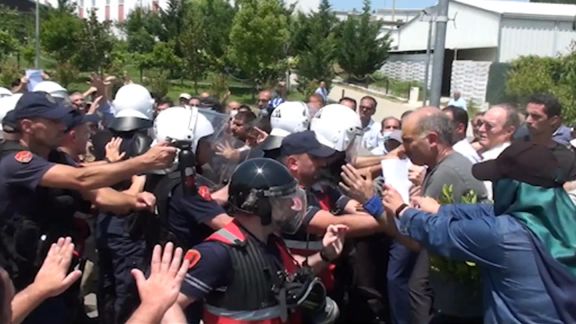US Says Albania’s Raid On Iranian MEK Compound Legal

The US has copped out of condemning the Albanian police raid into Camp Ashraf, a township where members of exiled opposition group Mojahedin-e-Khalq reside.
“The Albanian State Police have assured us that all actions were conducted in accordance with applicable laws, including with regard to the protection of the rights and freedoms of all persons in Albania,” read a statement issued on Tuesday.
Having found itself in quite a precarious predicament after dozens of Iranian dissidents seeking safe haven in Albania were reportedly injured Tuesday and one allegedly died in the raid, the State Department said it has been "assured" the Albanian government did not violate any human rights.
The State Department, which usually does not keep silent about such actions, and especially not against a group known to be active against the Islamic Republic, not only did not condemn the unexpected raid, but also distanced itself from the dissident group, raising concerns about the group’s actions against its own members.

"The State Department continues to have serious concerns about the MEK as an organization, including allegations of abuse committed against its own members,” noted the statement.
The State Department, however, pointed to the Albanian police accusations that the inhabitants of the camp were involved in cyberattacks against the Albanian government, adding, “We support the Government of Albania’s right to investigate any potential illegal activities within its territory."
Emphasizing that Washington does not view the MEK as “a viable democratic opposition movement that is representative of the Iranian people,” the State Department said, “The US government does not provide support or training to the MEK, does not contribute funding to the organization, and does not maintain substantive contact beyond issues related to the MEK’s resettlement, which was completed in 2016.”
Earlier on Tuesday, MEK said about a thousand Albanian police officers raided the group's exile center, Camp Ashraf, using tear gas and pepper spray. The group said that one of their members, identified as Ali Mostashari, was killed and more than a hundred others injured.
Despite initial denials, Albanian Interior Minister Bledi Cuci and the head of the national police, Muhamet Rrumbullaku, said both police officers and Iranian dissidents were injured during the raid at the Ashraf-3 camp near Manze, a small hill-town 30 kilometers (about 20 miles) west of Albania’s capital. However, the authorities disputed that the raid caused the man’s death.
Alleging that the attack was instigated by the Iranian regime, the MEK claimed that the actions by the Albanian police are “reminiscent of the criminal attacks by forces of Nouri al-Maliki (former prime minister of Iraq) on the original Camp Ashraf in Iraq between 2009 and 2015.”
Camp Ashraf 3 compound in Durres, Albania, is MEK's first home outside the Middle East established a few years after the 2013 massacre in the original Camp in Iraq in which 52 members died and seven went missing, leading to the relocation of the group.
In September 2022, Albania severed its relations with the Islamic Republic and expelled all Iranian diplomats and embassy staff following an investigation into a large-scale cyberattack that targeted the country’s infrastructure in July. The attack happened around the time of a conference held by the MEK.
The Tuesday attack against the de facto headquarters of the MEK took place about a month after the MEK-affiliated hacktivist group Uprising till Overthrow breached into 120 servers of the Iranian presidential office, getting access to internal communications, meetings minutes, and leaking troves of confidential data.